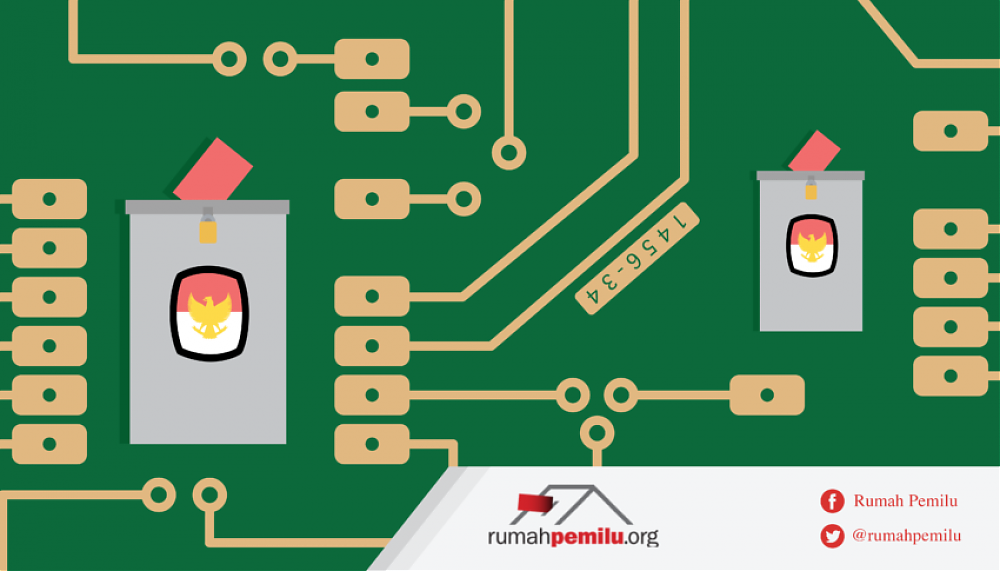All important data of Regional Head Election 2020 at the polling station level has not been fully opened in the Recapitulation or Sirekap Information System. In fact, data transparency can increase public confidence in the election results.
From Kompas's observations, the data displayed on the portal of the Electoral Commission (KPU), https://pilkada2020.kpu.go.id/, is limited to the voting of each candidate pair competing in the 2020 Regional Elections, as well as the development of incoming data from each polling station (TPS). The data is only a small part of the data uploaded by the Voting Organizing Group (KPPS) through the Sirekap application.
Network for Democracy and Electoral Integrity (Netgrit) researcher Hadar Nafis Gumay, in a discussion titled "Civil Society's Record on The Implementation of Regional Elections 2020", Sunday (12/13/2020), said that there are other important data that need to be opened to the public through the application made by the KPU. Among other things, the number of voters who exercised voting rights, ballots used, and invalid ballots.
"At least, the data opened is the same as in Situng (Calculation Information System). All important data from tps level should be published," said Hadar.
The data revealed to the public through Situng is the number of voters, users of voting rights, participation, valid votes, invalid votes, and total votes. Sirekap is an update of Situng.
Hadar said, with the disclosure of those data, the public can ensure the integrity of processes and data in the implementation of elections. The formula for checking data integrity is that the total vote count of candidates equals valid votes; and the accumulation of valid and invalid ballots is equal to the number of voters who exercise voting rights.
"If there is data that is not klop from the formula, it must be checked. It could be a miscalculation, but it could be because the process is not right. If now, right, not opened all the data, how does the public measure it and make sure it is correct or not?" said Hadar.
Not optimal yet
To find out the use of Sirekap, there were 64 respondents from civil society who filled out a monitoring form. The respondents monitored the use of Sirekap in 33 regencies/cities. From the data entered, there are 54.7 percent of KPPS who claim to be constrained by the use of Sirekap. The reason is that apps are difficult to open (43.8 percent) and there is no internet network (12.5 percent).
In addition, 76.6 percent of voters were not aware of Sirekap's use. The same was said by 56.3 percent of witnesses.
Researcher of the Association for Elections and Democracy (Perludem), Heroic Pratama, said, Sirekap is very important in electoral governance and minimizes complexity. However, with a number of obstacles encountered in the field, the KPU must further intensify the socialization of Sirekap and continue to conduct trials. In addition, the readiness of internet infrastructure is important to note.
"Don't technology become a paradox. Instead of making it easier for users and organizers of elections, it makes it difficult for election organizers because of these obstacles," said Heroik.
Election activist Wahidah Suaib agrees. According to him, constraints in the use of sirekap due to short socialization time and lack of trial period. "This needs to be a serious record for the KPU," he said.
Separately, CHAIRMAN of KPU Arief Budiman said, Sirekap is a new thing so there are still shortcomings. His party will continue to improve sirekap so that it can be used properly at the next election.
"Sirekap is important for openness, accuracy, and accountability of elections," said Arief.
Health procotol compliance
In addition to sirekap, monitoring is also carried out related to the compliance of voters, supervisors, and witnesses to health protocols in the TPS. A total of 127 respondents monitored in 50 districts / cities that held the 2020 elections.
From the monitoring results, 93.7 percent of voters have complied with health protocols during polling stations. In addition, 96.9 percent of TPS supervisors have also complied with health protocols. As for 93.7 percent of witnesses from prospective spouses have complied with health protocols.
Researcher from the Constitution and Democracy (Kode), Ihsan Maulana Initiative, assessed, the achievement of compliance level is appreciated and classified as good. However, he also criticized a number of issues that are still found in tps, ranging from the use of closed rooms to the emergence of queues.
It turns out that there are 36.2 percent of tps making in open space. In fact, the implementation of voting in the room is very vulnerable to transmission of the Covid-19 virus.
As for the queues, from monitoring the respondents, there were 18.1 percent still going into the crowd during the voting process. This, according to Ihsan, should be a serious evaluation because voters have actually been asked to attend according to the invitation hours to avoid the crowd.
"This needs to be highlighted in relation to how the evaluation of the implementation of yesterday's election. This also needs to be noted because there are still some districts that want to conduct re-elections, even in one district, Boven Digoel, has not conducted elections. Hopefully, the record related to health protocols, Sirekap, needs to be considered," said Ihsan. (NIKOLAUS HARBOWO/ IQBAL BASYARI)
Clip from an article published in the December 14, 2020 edition of Kompas on page 2 with the title "Sirekap Data Needs to Be Opened More Fully". https://www.kompas.id/baca/polhuk/2020/12/13/buka-data-penting-pilkada-2020-di-sirekap/











